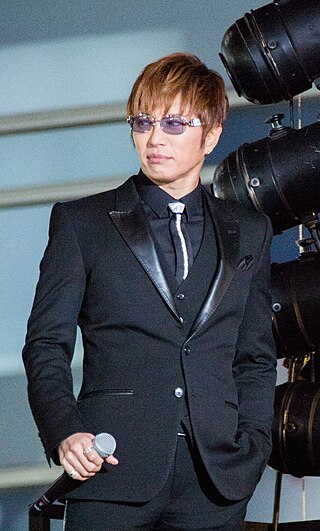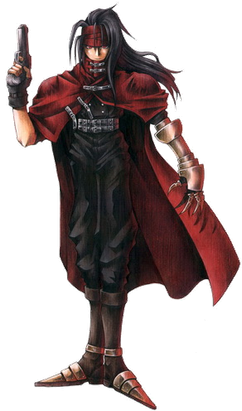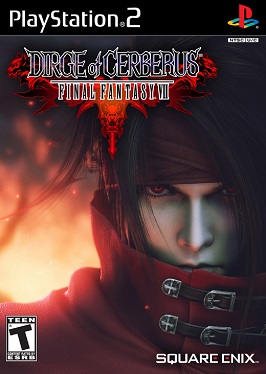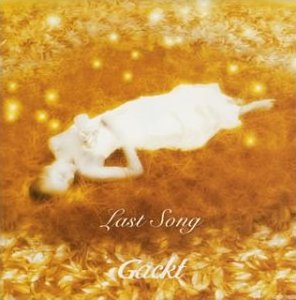
Gakuto Oshiro, better known by his mononymous stage name Gackt, is a Japanese singer-songwriter, musician, record producer and actor.

Vincent Valentine is a character in Square's 1997 role-playing video game Final Fantasy VII. He is designed by Tetsuya Nomura, and also appears in various titles from the Compilation of Final Fantasy VII, a metaseries set in the Final Fantasy VII continuity. He is the protagonist of the 2006 third-person shooter Dirge of Cerberus: Final Fantasy VII and its mobile phone tie-in Dirge of Cerberus: Lost Episode. Vincent is voiced in Japanese by Shōgo Suzuki and in English by Steven Blum and Matthew Mercer.
Final Fantasy is a media franchise created by Hironobu Sakaguchi and owned by Square Enix that includes video games, motion pictures, and other merchandise. The series began in 1987 as an eponymous role-playing video game developed by Square, spawning a video game series that became the central focus of the franchise. The music of the Final Fantasy series refers to the soundtracks of the Final Fantasy series of video games, as well as the surrounding medley of soundtrack, arranged, and compilation albums. The series' music ranges from very light background music to emotionally intense interweavings of character and situation leitmotifs.

Dirge of Cerberus: Final Fantasy VII is a 2006 action role-playing third-person shooter video game developed and published by Square Enix for the PlayStation 2. It is part of the Compilation of Final Fantasy VII metaseries, a multimedia collection set within the universe of Final Fantasy VII. The game is set three years after the events of the original game and focuses on one of the game's playable characters, Vincent Valentine. In the story, Vincent is targeted by Deepground, a mysterious organization that plans to awaken a creature known as Omega, with the ability to destroy the Planet.

The Compilation of Final Fantasy VII is a metaseries produced by Square Enix. A subseries stemming from the main Final Fantasy franchise, it is a collection of video games, animated features and short stories set in the world and continuity of Final Fantasy VII (1997). Officially announced in 2003 with the reveal of Final Fantasy VII: Advent Children, the series' core products are three video games and one film release. Alongside these are tie-in products and spin-offs including books, mobile games, and an original video animation. Advent Children and the mobile title Before Crisis are a sequel and prequel to VII respectively, focusing on Cloud Strife, the original game's main protagonist, and covert operatives known as the Turks. Crisis Core follows Zack Fair, a minor character in VII, while Dirge of Cerberus, a sequel to Advent Children, follows Vincent Valentine, one of the original's optional characters. The series has since been expanded to include more products, most notably a planned trilogy of games remaking the 1997 original; the first installment in this trilogy, Final Fantasy VII Remake, was released in 2020, while the second installment, Final Fantasy VII Rebirth, was released in 2024.

Mars is the first full-length studio album released by Japanese solo artist Gackt. It was released on April 26, 2000.
Final Fantasy VII is a role-playing video game by Square as the seventh installment in the Final Fantasy series. Released in 1997, the game sparked the release of a collection of media centered on the game entitled the Compilation of Final Fantasy VII. The music of the Final Fantasy VII series includes not only the soundtrack to the original game and its associated albums, but also the soundtracks and music albums released for the other titles in the collection. The first album produced was Final Fantasy VII Original Soundtrack, a compilation of all the music in the game. It was released as a soundtrack album on four CDs by DigiCube in 1997. A selection of tracks from the album was released in the single-disc Reunion Tracks by DigiCube the same year. Piano Collections Final Fantasy VII, an album featuring piano arrangements of pieces from the soundtrack, was released in 2003 by DigiCube, and Square Enix began reprinting all three albums in 2004. To date, these are the only released albums based on the original game's soundtrack, and were solely composed by regular series composer Nobuo Uematsu; his role for the majority of subsequent albums has been filled by Masashi Hamauzu and Takeharu Ishimoto.

Final Fantasy VII, a role-playing video game developed by Square, now Square Enix, and originally released in 1997, features many fictional characters in both major and minor roles. VII has been followed by multiple sequels and prequels, grouped into the multimedia series Compilation of Final Fantasy VII. These include the 2004 mobile game prequel Before Crisis, the 2005 movie sequel Advent Children, the 2006 shooter spin-off sequel Dirge of Cerberus, and the 2007 action game prequel Crisis Core. Other media include spin-off books and the original video animation Last Order. The setting of Final Fantasy VII has been described as industrial or post-industrial science fiction. It is referred to as "the Planet" in most games, and was retroactively named "Gaia" in some Square Enix promotional material.

The Sixth Day: Single Collection is a compilation album released by Gackt on February 25, 2004. The album collects the artist's previous single's title songs from 1999 up to 2003, some of them having been re-recorded for this release. The Sixth Day complements The Seventh Night, an unplugged album released three months later. In 2010, Gackt also released The Eleventh Day: Single Collection, which covers the material from 2004 to 2009.

The Seventh Night: Unplugged is a compilation album released by Gackt on May 26, 2004. It contains acoustic arrangements of previously released songs and complements The Sixth Day, a single collection released three months earlier. The unplugged theme of The Seventh Night would be continued by Gackt's subsequent album, Love Letter.

Moon is the third full-length studio album released by Japanese solo artist Gackt on June 19, 2002. Instead of a booklet, the concept album comes with a printed note by the artist, asking readers to "sense" the record's story, rather than analyzing the lyrics. The booklet was eventually included in the packaging of Moon's 2003 follow-up Crescent. Both albums are linked, as well as his more recent albums Diabolos and Last Moon from the "Moon Saga".

Crescent is the fourth full-length studio album released by Japanese solo artist Gackt on December 3, 2003. It is a concept album linked to its predecessor Moon and comes with booklets for both records. Crescent also features a duet with L'Arc-en-Ciel vocalist Hyde for "Orenji no Taiyou" with whom Gackt co-starred in the 2003 movie Moon Child.

Love Letter is the fifth full-length studio album originally released by Japanese solo artist Gackt on February 14, 2005 in Japan.

"Vanilla" is a second single released by Gackt on August 11, 1999. It peaked at fourth place on the Oricon Singles Chart and charted for ten weeks. It is Gackt's second best selling single, with 248,360 copies sold. "Vanilla" was re-released on March 20, 2002, when it peaked at number twelve and charted for 6 weeks. It was ceritifed gold by RIAJ.

The discography of Japanese recording artist Gackt consists of eight studio albums, eight compilation albums, one extended play, and forty-eight singles. In 1999 Gackt signed a recording contract with Nippon Crown. His breakthrough success was the EP Mizérable, which peaked at number 2 on the Oricon albums chart. His single "Returner ", released on June 20, 2007, was his first and only single to reach the number one spot on the Oricon charts to date. In 2007, his entire back catalogue, with live song recordings from Drug Party tour, was released on the iTunes Store, video collection "The Greatest Filmography" was released in the United States and Canada, and his album Diabolos was released in 18 European countries. From November 2008 until March 2010 his records were released under his own independent label Dears, but still supported by Nippon Crown. In April 2010, Gackt transferred to Avex Group. Since February 2014 they're released by his independent record label G&Lovers, which is supported by Crown Tokuma. As a solo artist, since 2009 are reported sales of over 10 million, and holds the male soloist record for most top ten consecutive chart singles as of July 18, 2011.

"Metamorphoze" is a single released by Gackt on May 25, 2005 under Nippon Crown.

"Todokanai Ai to Shitteita no ni Osaekirezu ni Aishitsuzuketa..." is a single released by Gackt on August 10, 2005 under Nippon Crown.

"Last Song" is a single released by Gackt on November 12, 2003 under Nippon Crown. It peaked at fifth place on the Oricon weekly chart and charted for 13 weeks. It was certified gold by RIAJ. An unplugged piano-only version was recorded, and music video filmed, for The Seventh Night: Unplugged.

"Black Stone" is a single released by Gackt on April 27, 2005 under Nippon Crown. It peaked at third place on the Oricon weekly chart and charted for seven weeks. It was certified gold by RIAJ.

"Kimi ni Aitakute" (君に逢いたくて) is a single released by Gackt on October 27, 2004 under Nippon Crown. It peaked at second place on the Oricon Singles Chart and charted for seventeen weeks. In 2004, it was the 96th best selling single of the year, with sales of 98,335 copies. It ultimately sold 124,280 copies, making it Gackt's ninth best selling single. It was certified gold by RIAJ.

















